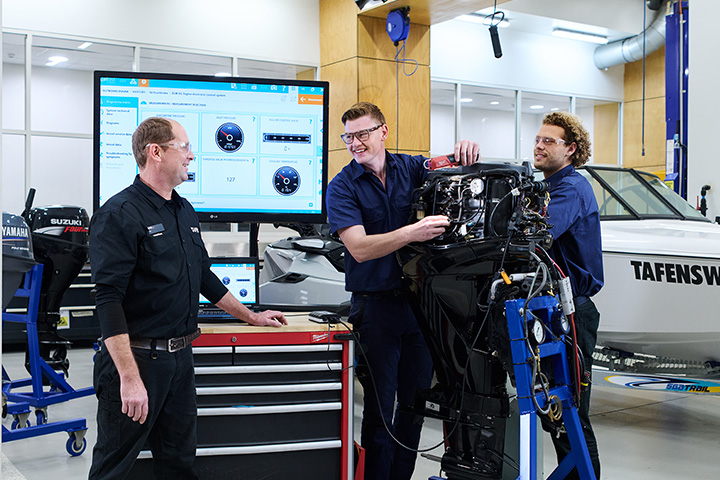Skip to main content
Start quiz
- Go to homepage
- Course areas
- Maritime
- Certificate IV in Maritime Operations (Marine Engine Driver Grade 1 Near Coastal)
Back to:Maritime
National code: MAR40224
Certificate IV in Maritime Operations (Marine Engine Driver Grade 1 Near Coastal)

Overview
About this course
Advance your marine engineering career. Gain the skills for Australian Maritime Safety Authority (AMSA) certification and qualify as a Marine Engine Driver Grade 1 Near Coastal on Australian domestic vessels.
Outcomes
What you'll gain
Learning outcomes
Through a mixture of theory and practical course work, learn to:
operate and maintain internal combustion engines, propulsion systems and auxiliary systems
undertake basic maintenance of electrical systems
maintain machinery, systems and components
carry out basic welding, brazing, cutting and machining work.
Course outcomes
Learn core skills that prepare you for opportunities in your chosen field.
Become eligible to apply for Marine Engine Driver Grade 1 Near Coastal (MED1) certification from AMSA.
Skills to operate and carry out maintenance on marine propulsion systems up to 1500 kW.
Ability to troubleshoot and repair complex machinery
Skills to manage onboard resources like crew members, spare parts, water and fuel.
Confidence to manage an engine room and a small engineering team.
Suitability
Is this course right for you?
Entry requirements
This course requires evidence of previous experience or study before you can enrol.
Hold an AMSA Marine Engine Driver Grade 2 certificate of competency (shown on your AMSA qualification card) or a mechanical trade qualification.
Have relevant maritime industry experience that can be used as qualifying sea service towards the AMSA Marine Engine Driver Grade 1 Certificate of Competency.
Sea time must be on vessels with inboard diesel engines of at least 375 kW.
Check the AMSA website to make sure you can meet all AMSA certification requirements.
Completion requirements
During your study you'll need to provide your teacher with the following evidence:
Entry recommendations
To be prepared for this course, we recommend that you have:
the physical ability to perform the duties of a Marine Engine Driver aboard a vessel, including operating engines and machinery, routine engine maintenance, performing safety checks and assisting with other vessel operations.
resistance to acute seasickness
the ability and willingness to work in all weather conditions
the capacity to move around a vessel and board survival craft unassisted
the ability to meet minimum medical fitness standards as stipulated for Marine Engine Driver Grade 1 on the AMSA website.
We tailor our courses to meet local community needs, so some campuses may have extra entry requirements. Check your preferred location for details. Need help preparing? Contact us for support.
Find Your Fit
This simple tool guides you to a suitable course level based on your foundation skills and confidence.
Pathways
Future career and study options
Career pathways
Our graduates go onto roles like:
Ship's Engineer
Marine Engineers control and manage the operation and maintenance of ship's plants and equipment.
Full-time share Full-time workers usually work 35 hours or more a week (in all their jobs combined).
89%
Employment size Employment size is the number of workers who do this as their main job.
300 workers
Average age This is the average age of all workers in this job.
45 years
Weekly pay Median earnings are shown for full-time, non-managerial employees paid at the adult rate, before tax or any amounts that are salary sacrificed. These figures are a guide to earnings only and should not be used to determine a wage rate.
$2,640
Average full-time The average full-time hours that people in this role work each week.
53 hours
Skill level rating Skill level ratings are based on the range and complexity of job roles. In general, the higher the skill level, the more formal education and training, previous experience or on-the-job training needed to be good at the job.
High
Gender share
1% female
Future growth The Department of Employment, Skills, Small and Family Business estimates the likely change in number of workers in this role, or industry, over the next 5 years. Future growth is the likely percentage change compared to all other job roles.
Strong Growth
Other jobs include: marine engine driver grade 1 near coastal (MED1), chief engineer on Australian domestic vessels with inboard engines up to 1500 kW , second engineer on Australian domestic vessels with inboard engines to 3000 kW and assistant to the chief engineer or vessel engine room worker on a vessel up to 100 m long with engines up to 3000 kW.
Licensing
The Australian Maritime Safety Authority (AMSA) sets the rules for each maritime qualification to make sure you’re fully prepared to work in that role. After finishing your TAFE NSW course, you’ll need to apply to AMSA and satisfy any certification prerequisites such as sea time and minimum medical fitness standards. For full details, visit the [AMSA website](https://www.amsa.gov.au/qualifications-training/domestic-qualifications/marine-engine-driver-grade-1-near-coastal.
Study pathways
Take your study further with other courses offered at TAFE NSW:
Previous study2 Courses
Begin here to gain experience and confidence in this study area.
Further study2 Courses
Advance your skills to take your career to the next level
Related study1 Course
Learn core skills that prepare you for opportunities in your chosen field.
Your experience counts
At TAFE NSW, we recognise your previous study and work experience. You can apply for recognition of prior learning or a credit transfer with any of our courses. If you're successful you'll get your qualification faster.
Units
Units taught in this course
Courses are made up of a combination of both core and specialty units. In the Certificate IV in Maritime Operations (Marine Engine Driver Grade 1 Near Coastal) qualification, you’ll need to successfully complete 29 units of competency, including 29 core and 0 speciality units.
Please note, not all specialty units are offered at every TAFE NSW location. It is highly recommended that you check with your preferred campus for information about the specialty units offered at that location.
Core units - 29
Core units are central to the job outcomes of a particular industry or occupation. These are the units industry has agreed are essential to be capable and qualified at a particular study level.
Operate propulsion transmission systems up to 1500 kWMARC054
Operate marine internal combustion engines and associated systems up to 1500 kWMARC053
Carry out engineering calculationsMARL046
Manage vessel stabilityMARA024
- ... 8
TAFE NSW services
Facilities and support
TAFE NSW provides support services across all campus locations and online. Whatever your needs or circumstances, we have the people, resources, counselling and facilities to support you in focusing on your studies.
TAFE NSW Disability Support Service
TAFE NSW Language, Literacy and Numeracy (LLN) support
TAFE NSW Aboriginal Support; Learner support (ABE)
TAFE NSW Careers, Counselling and Pathways Service
TAFE NSW Libraries
Scholarship programs - be supported as you explore your talents and fulfil your potential
Read&Write literacy and study support software is available free for all TAFE NSW students to use while studying on campus and at home
LinkedIn Learning - an online resource which offers innovative courses and tutorials to improve your personal and professional skills
Student associations - get social with our student community
Study options